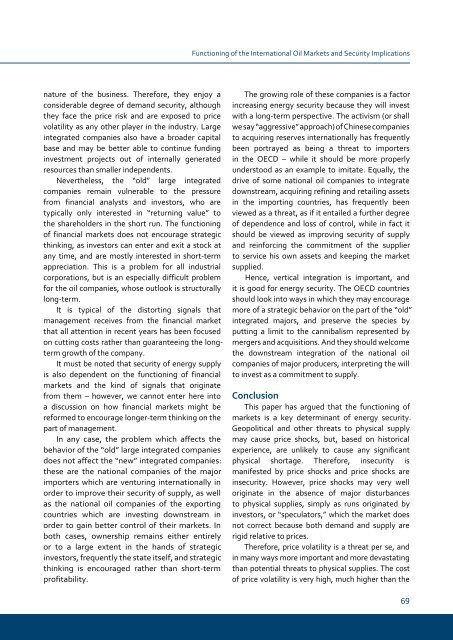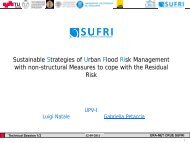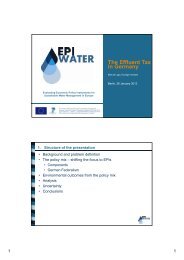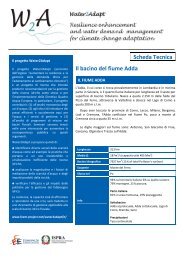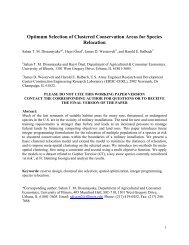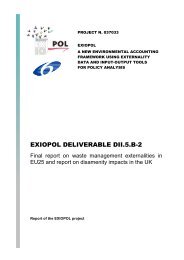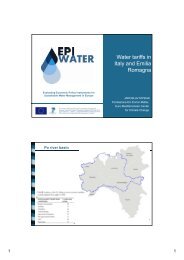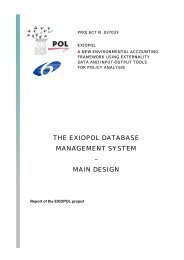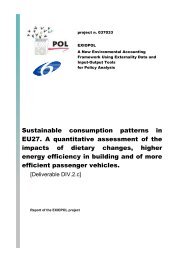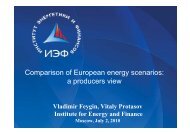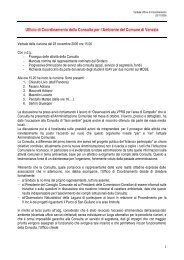Gulf and European Energy Supply Security - Feem-project.net
Gulf and European Energy Supply Security - Feem-project.net
Gulf and European Energy Supply Security - Feem-project.net
You also want an ePaper? Increase the reach of your titles
YUMPU automatically turns print PDFs into web optimized ePapers that Google loves.
nature of the business. Therefore, they enjoy a<br />
considerable degree of dem<strong>and</strong> security, although<br />
they face the price risk <strong>and</strong> are exposed to price<br />
volatility as any other player in the industry. Large<br />
integrated companies also have a broader capital<br />
base <strong>and</strong> may be better able to continue funding<br />
investment <strong>project</strong>s out of internally generated<br />
resources than smaller independents.<br />
Nevertheless, the “old” large integrated<br />
companies remain vulnerable to the pressure<br />
from financial analysts <strong>and</strong> investors, who are<br />
typically only interested in “returning value” to<br />
the shareholders in the short run. The functioning<br />
of financial markets does not encourage strategic<br />
thinking, as investors can enter <strong>and</strong> exit a stock at<br />
any time, <strong>and</strong> are mostly interested in short-term<br />
appreciation. This is a problem for all industrial<br />
corporations, but is an especially difficult problem<br />
for the oil companies, whose outlook is structurally<br />
long-term.<br />
It is typical of the distorting signals that<br />
management receives from the financial market<br />
that all attention in recent years has been focused<br />
on cutting costs rather than guaranteeing the longterm<br />
growth of the company.<br />
It must be noted that security of energy supply<br />
is also dependent on the functioning of financial<br />
markets <strong>and</strong> the kind of signals that originate<br />
from them – however, we cannot enter here into<br />
a discussion on how financial markets might be<br />
reformed to encourage longer-term thinking on the<br />
part of management.<br />
In any case, the problem which affects the<br />
behavior of the “old” large integrated companies<br />
does not affect the “new” integrated companies:<br />
these are the national companies of the major<br />
importers which are venturing internationally in<br />
order to improve their security of supply, as well<br />
as the national oil companies of the exporting<br />
countries which are investing downstream in<br />
order to gain better control of their markets. In<br />
both cases, ownership remains either entirely<br />
or to a large extent in the h<strong>and</strong>s of strategic<br />
investors, frequently the state itself, <strong>and</strong> strategic<br />
thinking is encouraged rather than short-term<br />
profitability.<br />
Functioning of the International Oil Markets <strong>and</strong> <strong>Security</strong> Implications<br />
The growing role of these companies is a factor<br />
increasing energy security because they will invest<br />
with a long-term perspective. The activism (or shall<br />
we say “aggressive” approach) of Chinese companies<br />
to acquiring reserves internationally has frequently<br />
been portrayed as being a threat to importers<br />
in the OECD – while it should be more properly<br />
understood as an example to imitate. Equally, the<br />
drive of some national oil companies to integrate<br />
downstream, acquiring refining <strong>and</strong> retailing assets<br />
in the importing countries, has frequently been<br />
viewed as a threat, as if it entailed a further degree<br />
of dependence <strong>and</strong> loss of control, while in fact it<br />
should be viewed as improving security of supply<br />
<strong>and</strong> reinforcing the commitment of the supplier<br />
to service his own assets <strong>and</strong> keeping the market<br />
supplied.<br />
Hence, vertical integration is important, <strong>and</strong><br />
it is good for energy security. The OECD countries<br />
should look into ways in which they may encourage<br />
more of a strategic behavior on the part of the “old”<br />
integrated majors, <strong>and</strong> preserve the species by<br />
putting a limit to the cannibalism represented by<br />
mergers <strong>and</strong> acquisitions. And they should welcome<br />
the downstream integration of the national oil<br />
companies of major producers, interpreting the will<br />
to invest as a commitment to supply.<br />
Conclusion<br />
This paper has argued that the functioning of<br />
markets is a key determinant of energy security.<br />
Geopolitical <strong>and</strong> other threats to physical supply<br />
may cause price shocks, but, based on historical<br />
experience, are unlikely to cause any significant<br />
physical shortage. Therefore, insecurity is<br />
manifested by price shocks <strong>and</strong> price shocks are<br />
insecurity. However, price shocks may very well<br />
originate in the absence of major disturbances<br />
to physical supplies, simply as runs originated by<br />
investors, or “speculators,” which the market does<br />
not correct because both dem<strong>and</strong> <strong>and</strong> supply are<br />
rigid relative to prices.<br />
Therefore, price volatility is a threat per se, <strong>and</strong><br />
in many ways more important <strong>and</strong> more devastating<br />
than potential threats to physical supplies. The cost<br />
of price volatility is very high, much higher than the


